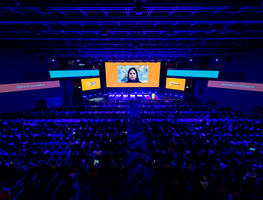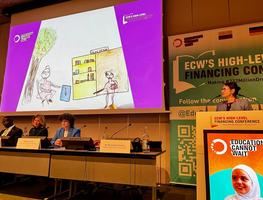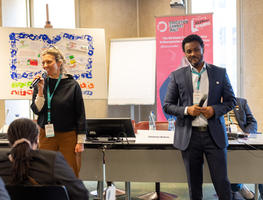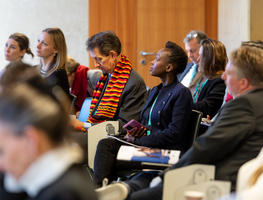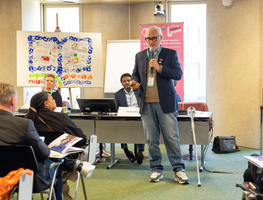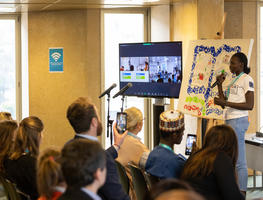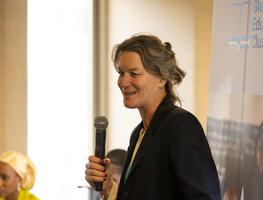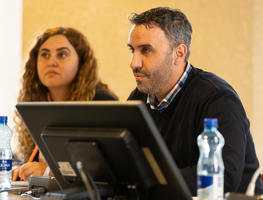Request support on coordination, information management, capacity development or other education in emergencies areas.
Demande de soutien en coordination, gestion de l’information, développement des capacités et autres domaines de l'éducation en situation d'urgence.
لطلب الدعم في مجال التنسيق ، إدارة المعلومات ، تنمية القدرات أو في اي مجال من مجالات التعليم في مناطق الطوارئ
Solicitar apoyo en coordinación, gestión de la información, desarrollo de capacidades u otra áreas en educación en emergencias.
On February 16-17, the Global Education Cluster (GEC) participated in the Education Cannot Wait (ECW) High-level Financing Conference (HLFC) held in Geneva, Switzerland. The HLFC raised over US$826 million in pledges to reach 20 million children with quality and holistic learning before 2026.
“Today we make history in our global efforts to ensure children impacted by conflict, climate change and other crises are able to access quality learning opportunities,” said Yasmine Sherif, Director of ECW.
ECW’s strategic partners, including the GEC, contributed to the conference by spotlighting the educational needs of the 222 million crisis-affected children and youth and actions to ensure the right to an education for learners across the world.
The conference gave voice to young people from diverse backgrounds as well as people with disabilities who spoke passionately about the inclusion of all children and youth in education systems.
At the conference, the GEC highlighted early childhood learning and development, an issue often overlooked in the sector. The session 'Championing Early Learning', moderated by Maria Agnese Giordano, Global Education Cluster Co Coordinator, UNICEF, brought together the Lego Foundation, Sesame Workshop, ECW, the Moving Minds Alliance and the GEC.
"We cannot champion children's early learning without resilient and localized systems to defend their right to play, learn and grow" said Nour Jarrouj, Senior Engagement Manager, Moving Minds Alliance.
The participants discussed how to build consensus around a new norm whereby early childhood development is prioritized across education in emergencies response—from needs assessment to response planning and funding allocations.
"If we do not give children the skills they need to build their foundations through early learning and play, how can they rebuild their communities following crises highlights," said Ms. Sherrie Westin, President, of Sesame Workshop.
Early learning is a key element of the GEC strategy. Building on this momentum, the GEC is committing to convening a roundtable with partners to move towards early childhood learning as a new norm education in emergencies response.
The GEC also contributed with a side event on 'Using Cash and Voucher Assistance to its Full Potential for Children’s Education'. The discussion was convened by the GEC Cash Task Team, and unpacked how CVA can be used to achieve positive educational outcomes for children, young people, and their communities, especially girls and children with disabilities. The event spotlighted voices from country teams and partners and profile promising tools, approaches, and resources.
Solomon Bekele, Cash and Voucher Program Manager, World Vision International, highlighted how unconditional cash assistance empowered affected populations to alleviate drought driven economic barriers preventing children from accessing education in Ethiopia.
Finally, the GEC led a side event on 'Demystifying Coordination: Why are Education Clusters Integral to achieving ECW’s Mission?' This session was moderated by Michelle Brown, Global Education Cluster Co-Coordinator, Save the Children, and highlighted the work of the education cluster and working groups in coordinating timely, accountable and effective responses.
Speaking at the event, Fadi Baidoun, Education Cluster Coordinator in the Occupied Palestinian Territory and Efsun Ilhan, Education Sector Co-Lead, Cox’s Bazaar, shared the perspectives of country partners and highlighted how generating evidence and data is critical to profile and elevate the voices and needs of children and young people.
“Clusters are a platform bringing a diverse range of stakeholders together under one umbrella to collectively identify needs and response priorities. Coordination is at the heart of a quality, consultative and holistic response” highlighted Fadi Baidoun.
“Coordination has a critical role in ensuring we are prepared to respond - early warning reports, convening partners, contingency planning are only some ways Clusters and Working Groups do this” said Efsun Ilhan, Cox’s Bazar Sector Co-Lead.
The audience also heard powerful stories and appeals by Nafisa, a child delegate from Nigeria and Sarafina, a youth delegate from South Sudan.
The HLFC was organized by ECW, in close collaboration with the Governments of Colombia, Germany, Niger, Norway, South Sudan, and Switzerland. The global conference convened more than 700 people on-site and over 2,000 online.

